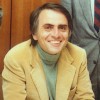 | Carl SaganAmerican astronomer, astrophysicist, cosmologist, author |
Skeptical scrutiny is the means, in both science and religion, by which deep insights can be winnowed from deep nonsense.
People are not stupid. They believe things for reasons. The last way for skeptics to get the attention of bright, curious, intelligent people is to belittle or condescend or to show arrogance toward their beliefs.
One of the saddest lessons of history is this: If we’ve been bamboozled long enough, we tend to reject any evidence of the bamboozle. We’re no longer interested in finding out the truth.
No nation, no religion, no economic system, no body of knowledge, is likely to have all the answers for our survival. There must be many social systems that would work far better than any now in existence. In the scientific tradition, our task is to find them.
A general problem with much of the theology is that the God portrayed is too small. It is a god of a tiny world and not a god of a galaxy, much less of a universe.
We all have a thirst for wonder. It`s a deeply human quality. Science and religion are both bound up with it. What I`m saying is, you don`t have to make stories up, you don`t have to exaggerate. There`s wonder and awe enough in the real world. Nature`s a lot better at inventing wonders than we are.
The chief deficiency I see in the skeptical movement is its polarization: Us vs. Them - the sense that we have a monopoly on the truth; that those other people who believe in all these stupid doctrines are morons; that if you`re sensible, you`ll listen to us; and if not, to hell with you. This is nonconstructive. It does not get our message across. It condemns us to permanent minority status.
I would love to believe that when I die I will live again, that some thinking, feeling, remembering part of me will continue. But as much as I want to believe that, and despite the ancient and worldwide cultural traditions that assert an afterlife, I know of nothing to suggest that it is more than wishful thinking.
Who is more humble? The scientist who looks at the universe with an open mind and accepts whatever the universe has to teach us, or somebody who says "Everything in this book must be considered the literal truth and never mind the fallibility of all the human beings involved in the writing of this book."?
The truth may be puzzling. It may take some work to grapple with. It may be counterintuitive. It may contradict deeply held prejudices. It may not be consonant with what we desperately want to be true. But our preferences do not determine what`s true.
If we can't think for ourselves, if we're unwilling to question authority, then we're just putty in the hands of those in power. But if the citizens are educated and form their own opinions, then those in power work for us.
You can get into a habit of thought in which you enjoy making fun of all those other people who don`t see things as clearly as you do. We have to guard carefully against it.